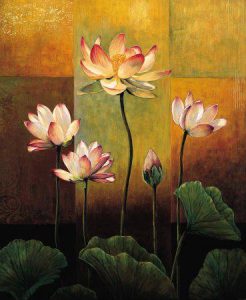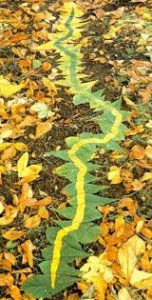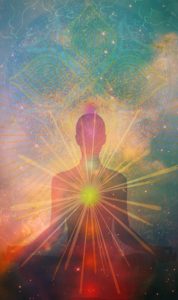 The Yogabliss on-line Moving into Meditation class met this morning. Thanks to every one of you who bring your presence and feel the truth of what’s happening in ourselves, our community and our society. So many of us are heavy hearted – literally breathing in smoke – and also witnessing the destruction of the many kinds of fire burning in our communities. Today we explored how to cultivate equanimity and compassion. – Meditation teacher Gil Fronsdal describes equanimity as being centered in the middle of change, to see with patience and understanding. Equanimity is the protector of compassion and love.
The Yogabliss on-line Moving into Meditation class met this morning. Thanks to every one of you who bring your presence and feel the truth of what’s happening in ourselves, our community and our society. So many of us are heavy hearted – literally breathing in smoke – and also witnessing the destruction of the many kinds of fire burning in our communities. Today we explored how to cultivate equanimity and compassion. – Meditation teacher Gil Fronsdal describes equanimity as being centered in the middle of change, to see with patience and understanding. Equanimity is the protector of compassion and love.
We drew on the teachings of Thich Nhat Hanh, often referred to as Thay or teacher, and his student Cheri Maples. Thay is sometimes called the “father of mindfulness.” Martin Luther King nominated the Vietnamese Zen Master for a Nobel Peace Prize in 1967. You can read more about his life’s work as a peace activist in the 2019 Time article, The Monk Who Taught the World Mindfulness Awaits the End of This Life.
 Cheri served in the criminal justice system for over 25 years. After meeting Thay, she became a meditation teacher and together they introduced mindfulness to the police officers of Madison, Wisconsin. After listening to her 2015 talk on social engagement I got some practical insight into how to cultivate equanimity in my daily life. Days after hearing her caring voice, I learned of her 2017 passing from complications of injuries sustained in a traumatic cycling accident. I didn’t know Cheri personally and I feel her loss deeply. We need caring, practical, loving voices like hers now more than ever.
Cheri served in the criminal justice system for over 25 years. After meeting Thay, she became a meditation teacher and together they introduced mindfulness to the police officers of Madison, Wisconsin. After listening to her 2015 talk on social engagement I got some practical insight into how to cultivate equanimity in my daily life. Days after hearing her caring voice, I learned of her 2017 passing from complications of injuries sustained in a traumatic cycling accident. I didn’t know Cheri personally and I feel her loss deeply. We need caring, practical, loving voices like hers now more than ever.
We were also inspired by the transformational poems of Naomi Shihab Nye. Naomi was born to a Palestinian father and American mother. She grew up in Missouri, Jerusalem and Texas. Her poems, Cross That Line and Two Countries invite our creative imagination and empathy to reach past differences and to go to places larger than ourselves.
 Cross That Line was inspired by singer, actor, athlete, scholar and political activist, Paul Robeson. On May 18, 1952 he performed an outdoor concert for more than 25,000 people (estimates range as high as 45,000) gathered on both sides of the United States/Canadian border at Peace Arch Park in Blaine. He sang from a platform on the back of a truck. His passport had been confiscated by the State Department after he refused to sign an affidavit stating he was a communist. He sang in English, songs of peace in Russian and Chinese, songs of liberty in a tongue of the African villages. Despite the racially and politically charged struggle in which Robeson was engaged at the time of this concert, the event was unmarred by violence.
Cross That Line was inspired by singer, actor, athlete, scholar and political activist, Paul Robeson. On May 18, 1952 he performed an outdoor concert for more than 25,000 people (estimates range as high as 45,000) gathered on both sides of the United States/Canadian border at Peace Arch Park in Blaine. He sang from a platform on the back of a truck. His passport had been confiscated by the State Department after he refused to sign an affidavit stating he was a communist. He sang in English, songs of peace in Russian and Chinese, songs of liberty in a tongue of the African villages. Despite the racially and politically charged struggle in which Robeson was engaged at the time of this concert, the event was unmarred by violence.
Relaxed Reflection
Let’s reflect for a moment on how we experience compassion . . . What were you able to bring to your tender hearted experience in our meditation? What response do you have to the invitation to offer yourself compassion? To offer compassion to others? . . . The word itself seems to hold so many elements: awareness, patience, receptivity, forgiveness, courage, honesty . . . All of these deeply human qualities . . . are often overwhelmed by the deeply human instincts we have to feel safe and secure and by our lifelong, inter-generational conditioning. We are here today because we want to practice mindfulness. This is where we learn how to respond to the strongest emotions.
In his 2003 On Being interview, Being Peace in a World of Trauma, Meditation teacher, writer, Nobel Peace nominee, Thich Nhat Hanh said:
 . . . when you are mindful, you are fully alive. You are fully present. You can get in touch with the wonders of life that can nourish you and heal you. And you are stronger. You are more solid in order to handle the suffering inside of you and around you. When you are mindful, you can recognize, embrace, and handle the pain, the sorrow in you and around you to bring you relief. And if you continue with concentration and insight, you’ll be able to transform the suffering inside and help transform the suffering around you.
. . . when you are mindful, you are fully alive. You are fully present. You can get in touch with the wonders of life that can nourish you and heal you. And you are stronger. You are more solid in order to handle the suffering inside of you and around you. When you are mindful, you can recognize, embrace, and handle the pain, the sorrow in you and around you to bring you relief. And if you continue with concentration and insight, you’ll be able to transform the suffering inside and help transform the suffering around you.
In that same interview, Cheri Maples added:
You know, as a police officer, you’re so often a victim and so often an oppressor. You really have to come to grips with both of those. And I started to understand that it’s possible to bring this [mindfulness] into your work as a cop, because as my energy started to change, the energy that I got back from other people started to change, even including the people that I had to arrest.
Meditation teacher and clinical social worker, Cheri Maples drew from long experience teaching mindfulness to police officers and to people in prison. In her 2015 talk, Engaging Ourselves, Engaging Our World, she described the need for balancing compassion with equanimity. She said:
[The character of compassion] is really built upon the willingness to surrender . . . self righteousness which is the only way to cross that divide that separates us from them or me from you. Mistakes and regrets aren’t a problem in building compassion, really they are the building blocks the practice of compassion is built upon. Compassion is  . . . also about commitment to honesty . . .
. . . also about commitment to honesty . . .
Compassion allows us to respond to suffering with a tender heart. But we need to steady ourselves in the midst of our tender heartedness. Without equanimity, compassion can burn with too much passion and it can exhaust us and actually create more suffering. Equanimity allows us to rest in some spaciousness. . . . The training ground for this kind of equanimity is to learn to be still amidst the smaller things . . . being with the small transgressions that take place during the course of our days . . . We all have some experience to draw from . . . the traffic jam . . . the annoyance with people repeating themselves. . . the lines I have to stand in . . . the pain in my back or my joints. . . .
By opening to all these small moments where aversion and resistance arise .. . we develop the capactiy to stay present with greater challenges. By training with the little stuff, we train ourselves with the big stuff.
Right now, we can reflect on how we respond to the little stuff in our lives. When was the last time small annoyances seemed to build up until you lost your temper? And how did you recover? Were you willing to acknowledge and repair hurt feelings? These mistakes and regrets – they are the building blocks of compassion. We build with those qualities of compassion – awareness, patience, receptivity, forgiveness, courage, honesty.
In her poem, Cross That Line, Naomi Shihab Nye asks us to reflect on how we communicate with eachother.
Listen
Paul Robeson stood
on the northern border
of the USA
and sang into Canada
where a vast audience
sat on folding chairs
waiting to hear him.
 He sang into Canada.
He sang into Canada.
His voice left the USA
when his body was
not allowed to cross
that line.
Remind us again,
brave friend.
What countries may we
sing into?
What lines should we all
be crossing?
What songs travel toward us
from far away
to deepen our days?
Our practice enables us to contemplate the lines we could be crossing in our lives. Where do we send our voices? What are we touching with our words? Who do we speak to or on behalf of? What songs do we hear? Do we listen for the songs that open our hearts?
Thich Nhat Hanh comes back to the fundamental tools of awakening to address the large conflicts that have ever been with us. He said:
 The individual has to wake up to the fact that violence cannot end violence, that only understanding and compassion can neutralize violence because, with the practice of loving speech and compassionate listening, you can begin to understand people and help people to remove the wrong perceptions in them because these wrong perceptions are at the foundation of their anger, their fear, their violence, their hate. And listen deeply. You might be able to remove the wrong perception you have within yourself concerning you and concerning them. . . .
The individual has to wake up to the fact that violence cannot end violence, that only understanding and compassion can neutralize violence because, with the practice of loving speech and compassionate listening, you can begin to understand people and help people to remove the wrong perceptions in them because these wrong perceptions are at the foundation of their anger, their fear, their violence, their hate. And listen deeply. You might be able to remove the wrong perception you have within yourself concerning you and concerning them. . . .
So simple, so powerful to be reminded that communication – loving speech, compassionate listening – is the basic work for peace. Can we bring the elements of compassion to our language and our listening – awareness, patience, receptivity, forgiveness, courage, honesty?
Naomi Shihab Nye’s poem, Two Countries, reminds us of the very intimate longing that we humans share – to belong, to be heard, to be seen, to be touched.
 Listen
Listen
Skin remembers how long the years grow
when skin is not touched, a gray tunnel
of singleness, feather lost from the tail
of a bird, swirling onto a step,
swept away by someone who never saw
it was a feather. Skin ate, walked,
slept by itself, knew how to raise a
see-you-later hand. But skin felt
it was never seen, never known as
a land on the map, nose like a city,
hip like a city, gleaming dome of the mosque
and the hundred corridors of cinnamon and rope.
Skin had hope, that’s what skin does.
Heals over the scarred place, makes a road.
Love means you breathe in two countries.
And skin remembers–silk, spiny grass,
deep in the pocket that is skin’s secret own.
Even now, when skin is not alone,
it remembers being alone and thanks something larger
that there are travelers, that people go places
larger than themselves.
We too can remember being alone and feel thankful for the travelers – the people that go places larger than themselves.
